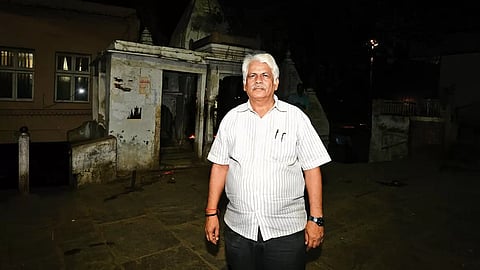Shiva in Kashi
Diary: Shiva In Kashi
Kashi is the seat of learning, where people worship both Shiva and Ram (Shiva-Ram) in the hope of getting salvation
Kashi is the city that provides salvation. It is said Kashi-kashyam marnam mukti (Dying in Kashi offers salvation, escape from the endless cycle of birth and death). According to Tarak-Mantra, Shiva is the destroyer and the provider of salvation. Goswami Tulsidas states this in the Uttarkand of the Barvai Ramayana, “Mahima Ram Naam Ki Jaan Mahesh /Det Param pad Kashi Kar Updesh / Bhagwaan Bhoot Bhawan (Shiva resides in Kashi chanting Ram’s name, remembering him as playing in the courtyard of King Dasharatha’s palace. Shiva preaches the mantra for salvation that is the name of ‘Ram’ to all human beings).”
Kashi is the seat of learning and the dwelling space of Shiva. Here, people worship Shiva and Ram (Shiva-Ram) in the hope of getting salvation. Shiva has said, “Mukti Janm Mahi Jaan Gyan Khan Agh Haani kar/Jahan Basain Sambhu Bhawani So Kashi Saiyay Kas Na (Why not to reside in Kashi, the modern Varanasi, the abode of Shambhu and Bhawani—Shiva and Parvati—knowing it to be the birthplace of Mukti/place of salvation, the place of spiritual wisdom and destroyer of all sorts of sins)?”
An unbreakable bond
Shiva always holds Ayodhya in his heart, every action and discourse. This proves that an element of Shiva is present in the Ayodhya movement. For attaining real Ram Rajya, every individual has a say and lives harmoniously.
Sanatana Dharma is rooted in the Vedas and the Upanishads, strongly implying that there are separate gods with distinct powers and responsibilities. While Shiva is the destroyer and provider of salvation, Brahma is the creator, and Vishnu, the preserver. Sanatana Dharma believes that Ram is Vishnu’s incarnation and the Supreme power of the universe. Ram Twam Parmatm Shri Sachidanand Vigrah. Ram and Shiva are believed to have similar characteristics despite having adopted various roles.

A couplet from Ramayana Dohawali, sums up this bond: Jai Sharire Ratiram so Aadar hi sujan/Rudra Deh Taji Neh Vas Vanar Bhai Hanuman (Rudra or Shiva transformed himself in the bodily figure of Hanuman, in order to get devotion of his deity. It is the true representation of Shiva’s ultimate/extreme devotion for his deity, Prambrahm Bhagwaan Ram.) Ancient scriptures say Ram is also a great devotee of Shiva, as Ram during his exile established a Shiva temple in Rameswaram in south India.
Ling thap kari vidhivat puja Shiva samaan Priya mohi na dooja/Shiva drohi mam bhagat kahava sokar sapnon mohi na bhava/Shankar vimookh bhagati chah mori so nar ki moodh mati mori (“I will install an idol of Lord Shambhu here; it is the crowning ambition of my heart”. Hearing this, the lord of the monkeys dispatched a number of messengers, who invited and fetched all the great sages. Having installed an idol of Shiva and worshipped it with due solemnity. He said, “No one else is so dear to me as Shiva. An enemy of Shiva, although he calls himself a devotee of mine, cannot attain my bhakti even in a dream. He who is opposed to Shankar, and yet aspires for devotion to me is doomed to perdition, stupid and dull-witted as he is.”).
Ram has great affection for Shiva. Shiva in the form of Hanuman supported Ram to eradicate social evils and establish real Ram Rajya. Without worshipping Shiva no one can seek Ram’s devotion. Politicians exploit people’s sentiments in the name of Ram and Shiva.
For the sake of Maya
No one can be Shiva’s incarnation because he is ejanma (never-born/unborn). According to Sanatan Aashram and Varna Vyavastha, our religious texts endorse incarnation. Goswami Tulsidas has said, “Vipra Dhenu Sur Sant Hit Linha Manuj Avataar/Nij Ichha Nirmit Tanu Maya Goon Go Paar (For the sake of Brahmins, cows, Gods and saints, the lord who transcends Maya and is beyond the three modes of prakruti—Sattva, Rajas and Tamas—as well as beyond the reach of the senses, took birth as a man assuming a form that is a product of his own will, not worldly elements).” It is presumed all living beings are part of his Maya, and that the Supreme power is the creator of this Maya. In case things are out of order, it is followed by an avatar (incarnation) to rearrange Maya in the way that is needed.
(This appeared in the print edition as "Shiva Diary")
Vishwambhar Nath Mishra, Mahant, Akhada Goswami Tulsidas, Sankat Mochan Foundation, Varanasi
Tags